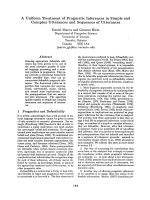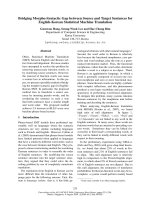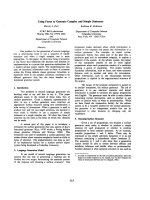Compound and complex sentences
Bạn đang xem bản rút gọn của tài liệu. Xem và tải ngay bản đầy đủ của tài liệu tại đây (8.01 KB, 1 trang )
Compound and complex sentences
A compound sentence has two or more independent clauses connected by a coordinating conjunction. Common
examples of coordinating conjunctions are: and, but, or, nor, for, yet, so.
A complex sentence has a main clause and one or more dependent clauses. In a complex sentence we use a
subordinating conjunction to connect the dependent clause to the main clause. Common examples of
subordinating conjunctions are: as, when, while, because, since, after, before, although, though, if, whether,
unless and until.
We can change a compound sentence into a complex sentence by replacing the coordinating conjunction with a
subordinating conjunction. Study the examples given below.
The doctor must come at once or the patient will die. (Compound sentence)
If the doctor does not come at once, the patient will die. (Complex sentence)
Gandhi believed in non-violence but some of his followers were extremists. (Compound sentence)
Though Gandhi believed in non-violence some of his followers were extremists. (Complex sentence)
Search his pockets and you will find the stolen watch. (Compound sentence)
If you search his pockets, you will find the stolen watch. (Complex sentence)
You must hurry or you will miss the train. (Compound sentence)
If you do not hurry you will miss the train. (Complex sentence)
He wants to be a scholar, so he is studying hard. (Compound sentence)
As he wants to be a scholar he is studying hard. (Complex sentence)
Stay on top of your writing! Download our grammar guide from www.englishgrammar.org to stay up-to-date.
Powered by TCPDF (www.tcpdf.org)









